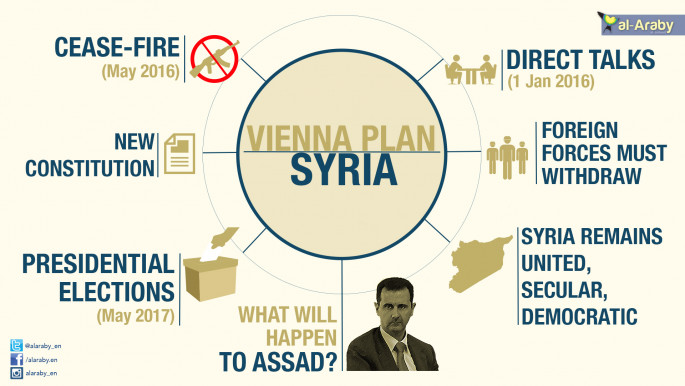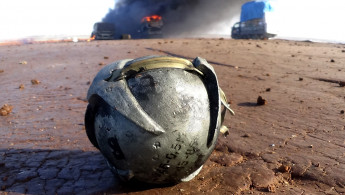Russia and Qatar 'agree' on encouraging Syria government-opposition talks
Lavrov said on Friday he would not disclose further details about the agreement. Russia is a staunch supporter of Syrian President Bashar al-Assad, who Qatar and other Middle East countries accuse of war crimes.
Lavrov hosted Qatari Foreign Minister Khaled bin Mohammad Al Attiyah in Moscow Friday.
The Russian envoy said he is seeing more willingness from Assad's opponents, like Qatar, to launch the talks between the Syrian government and the opposition.
Speaking to reporters after the talks, Attiyah accused Assad of supporting terrorist groups while Lavrov insisted that "it's up to the Syrian people" to decide Assad's future.
Meanwhile in Beijing, Syrian Foreign Minister Walid al-Moualem said on Friday international efforts should focus on preventing insurgents from infiltrating from Turkey and Jordan to achieve progress towards a political settlement in Syria.
State media, which flashed the comments Moualem made after meeting a senior Chinese official during a visit to Beijing, quoted him as saying he stressed the need to "implement UN Security Council resolutions on fighting terror."
| Read more: What is at stake during Qatari FM's visit to Moscow? |
Moualem had said on Thursday Syria was ready to take part in peace talks in Geneva and hoped that the dialogue would help it form a national unity government.
The UN Security Council last Friday unanimously approved a resolution endorsing a peace process for Syria, including a cease-fire and talks between the Syrian government and the opposition.
The Syrian regime has often accused both Ankara and Amman of supporting "terrorists", a blanket term used by Damascus to describe all rebels, including both moderates and jihadists.
Gains against IS
Back in Syria, a US-backed coalition of rebels in Syria - including Syrian Kurdish, Arab and Christian groups - captured several areas in the country's north from Islamic State (IS) extremists as government air raids on a rebel-held Damascus suburb killed at least 20 people on Thursday.
The advance on Thursday of the coalition known as Syria Democratic Forces (SDF) came as part of a recent rebel push to take control of a major dam and cut supply lines between IS strongholds in northern Syria.
The SDF offensive started Wednesday with a push south of the Turkey-Syria border town of Kobani, according to a rebel spokesman, Col. Talal Sillu.
On Thursday, coalition fighters advanced eight kilometers, inching closer to their objective - the Tishrin Dam on the Euphrates River that supplies much of northern Syria with electricity.
"The situation on the ground is excellent," said Sillu. The rebels are also trying to cut the supply lines between the IS de-facto capital of Raqqa and the group's stronghold of Manbij.
 |
In Syria, Kurdish-dominated rebels of the SDF made gains against Islamic State extremists over the past few days, while IS and other extremists rebels were set to evacuate a suburb of Damascus under a newly brokered deal |  |
Several villages, farms and weapons were taken in battles with IS, the spokesman said, adding that at least 14 IS fighters have been killed since Wednesday.
The SDF, dominated by the main Kurdish militia in Syria known as YPG, or People's Protection Units, has become a main force in fighting IS, capturing dozens of villages in northern Syria over the past weeks.
However, in eastern Syria, IS seized a district previously held by Syrian government forces in the city of Deir ez-Zor after heavy clashes with troops holed up inside, the extremist group and Syrian opposition activists said Thursday.
The seizure expands the IS presence in the contested eastern region.
The city of Deir ez-Zor is held mostly by IS but Syrian troops control a few districts inside it and the airport on its outskirts.
IS fighters have in recent weeks launched several attacks in attempts to capture government-held parts of the city and the nearby airport, without success.
IS evacuates southern Damascus suburb
Eighteen buses arrived in al-Qadm area of Damascus to take 2,000 extremist fighters and 1,500 family members away from the Palestinian refugee camp of Yarmouk and adjoining Hajar al Aswad - a stronghold of IS fighters - to areas under the control of IS and other rebel groups.
It was not clear whether the buses were provided by the United Nations or by the Syrian army.
SOHR had reported IS was to start evacuating its wounded fighters from the Damascus southern suburb of Qadam to areas held by the extremists in northern Syria under a newly brokered deal.
The activist group said that in the second phase, families of IS fighters will be evacuated and then the fighters themselves will leave Qadam, the nearby neighbourhood of Hajar Aswad and the Palestinian refugee camp of Yarmouk.
The Lebanon-based Al-Mayadeen TV said the evacuation would begin on Saturday, adding the thousands of fighters and their families will be given safe passage to Raqqa and the extremists' stronghold of Marei in the northern province of Aleppo.
A Palestinian official in Damascus confirmed the deal, but stressed that Palestinian factions were not part of it.
The official, who spoke on condition of anonymity because of the secret negotiations over the deal, said it was struck between representatives of the Syrian state and some rebel factions - presumably negotiating on behalf of IS.
In April, IS militants infiltrated the Yarmouk camp in what was their deepest foray into Damascus, the seat of President Bashar al-Assad's power.
The latest deal and the IS evacuation could pave the way for other reconciliation gestures between the government and rebel factions based in the southern edges of the Syrian capital.
The Syrian civil war has killed more than a quarter of a million people since it started nearly five years ago, and displaced half the Middle Eastern country's pre-war population of 23 million.
 |
| [Click to enlarge] |





 Follow the Middle East's top stories in English at The New Arab on Google News
Follow the Middle East's top stories in English at The New Arab on Google News
![Netanyahu furiously denounced the ICC [Getty]](/sites/default/files/styles/image_330x185/public/2024-11/GettyImages-2169352575.jpg?h=199d8c1f&itok=-vRiruf5)
![Both Hamas and the Palestinian Authority welcomed the ICC arrest warrants [Getty]](/sites/default/files/styles/image_330x185/public/2024-11/GettyImages-2178351173.jpg?h=199d8c1f&itok=TV858iVg)
